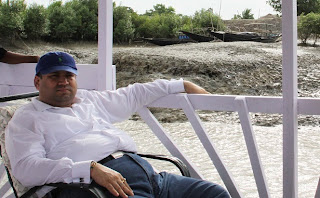In Bengal’s tiger land – Sunderbans

August 8, 2013: Last week when I got the official letter from Alipore Zoological Gardens (Alipore Zoo) granting me my request to adopt a Royal Bengal tiger my joy knew no bounds. I had written to the forest departments and many zoos in India and abroad with request to adopt a big cat. I am glad that Alipore Zoo Kolkata, which is located in my city of residence, turned out to be the first to respond to my request.

I am very thankful to Mr Y K Yadav, acting director of Alipore Zoological Gardens, Kolkata, for implementing the animal adoption scheme very successfully.
There has been an overwhelming response from the citizens of Kolkata and beyond. This would go a long way in improving infrastructure and facilities for the animal in the zoo.

I got the official permission to adopt a yet-to-be-named and the youngest of the four Royal Bengal tigers in the Zoo. This tigress is 8 years 5 months old as on date and was born to a Royal Bengal tigress Krishnaa and a white tiger Anirban on March 4, 2005. The Royal Bengal tigers at the zoo include Krishno (13 year old), Teesta (12 year tigress) and another unnamed male tiger. At present, this adopted tigress of mine is housed in a new glass enclosure which opens up to a mound opposite the VIP car parking area.
Yesterday a day after the discussion on my book, The Safari, on the tigers of Ranthambore, I along with wildlife conservationists, Belinda Wright of Wildlife Protection Society of India (WPSI) and Nitin Desai, went to the remote Bali islands in the Sunderbans which is Bengal’s tiger land.

We also visited the small school in the island. WPSI and Bali Nature & Wildlife Conservation Society run the school as a part of their outreach program. WPSI runs many social projects including health camps, solar lighting, rain water harvesting and empowerment of women and so on.
Belinda and I share a peculiar observation of ours about the tigers of Sunderbans. That is, till date, we haven’t seen a picture of a Royal Bengal tiger in the Sunderbans relaxing in the wild. All the pictures of the tigers in Sunderbans are seen to be in action – carrying a kill, diving into the water, wading through the marshes, disappearing into the groves. The Sunderbans tigers are one of the most elusive creatures in the world mainly due to the sprawling and inhospitable mangrove habitat which is also the largest in the world.

Sunderbans is a 36,000 hectare biosphere reserve, a National Park of India, a tiger reserve, a UNESCO World Heritage Site and world’s largest mangrove deltaic region spreading across West Bengal in India and mostly in neighbouring Bangladesh.
I think much work has been done in India with respect to tiger conservation but we can hardly rest on our achievements as the challenges that we face are immense. With the kinds of Belinda and Nitin and others, I see there is lot of hope for the tiger conservation programs started in India. ess bee
